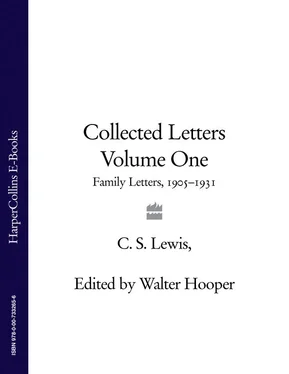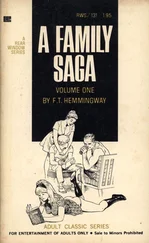All the same, when you begin to write a letter you just go on babbling–at least I do–without thinking whether the person at the other end is interested or not, till you come to the last page and find that you haven’t really said what you wanted to. But perhaps that sort of rambling is the right kind of letter. I don’t know whether you personally write that way or not, but the result is charming, and you can’t think how eager I am to see the atrocious but familiar scroll waiting for me on the hall table. And yet, every letter is a disappointment: for a minute or two I was carried back to your room at Bernagh–don’t you remember rooms by their smells? Each one has its own–and seem to be talking to you, and then suddenly I come to the end and it’s all only a little bit of paper in my hand and Gastons again. But come. We are being mawkish. I think you and I ought to publish our letters (they’d be a jolly interesting book by the way) under the title of lamentations, as we are always jawing about our sorrows. I gather it was that beastly girl in Mayne’s who ‘flared up’ as you say. Aren’t they rude in that place? I think we ought to start a movement in the neighbourhood to boycott them. Only we’d have to join in it ourselves, which would be a pity.
No: I have never yet seen Kelsie’s book. I daresay she doesn’t know that I take an interest in such things, and you are lucky in having a reputation as a connoisseur which makes you free of every library in Belmont–tho’ there aren’t very many to be sure. I am afraid our Galahad will be growing a very stodgy mind if he reads nothing but Trollope and Goldsmith and Austen. Of course they are all very good, but I don’t think myself I could stand such a dose of stolidity. I suppose you will reply that I am too much the other way, and will grow a very unbalanced mind if I read nothing but lyrics and fairy tales. I believe you are right, but I find it so hard to start a fresh novel: I have a lazy desire to dally with the old favourites again. I think you’ll have to take me in hand and set me a ‘course’ when I come home.
By the way what about the piano and the gramophone these days? We don’t seem to talk of music so much now as we did: of course your knowledge on that subject is so much greater than mine that I can really only express a philistine’s taste. Are you still going to Walker? For my part, I have found my musical soul again–you will be relieved to hear–this time in the preludes of Chopin. I suppose you must have played them to me, but I never noticed them before. Aren’t they wonderful? Although Mrs K. doesn’t play them well, they are so passionate, so hopeless, I could almost cry over them: they are unbearable. I will find out the numbers of the ones I mean and we will have a feast next holidays.
By the way, you speak in your last letter of the difference between music and books: I think (to get back to an old argument) it is just the same difference as between friendship and love. The one is a calm and easy going satisfaction, the other a sort of madness: we take possession of one, the other takes possession of us: the one is always pleasant the other in its greatest moments of joy is painful. But perhaps I am rating books and friendship too low, because poetry and great novels do sometimes rouse you almost as much as music: the great love scenes in Shirley for instance, or the best parts of Swinburne etc.
I am sorry I always make the mistake about your address. Hullo–I’ve done it again.
Yours,
Jack
TO ARTHUR GREEVES (LP V: 64-5):
[Gastons
21 March 1916]
My dear Galahad,
So here we are at the weekly letter, and very glad I am too; but Heavens!–how the weeks run on don’t they? While I was at Malvern I used to count the days and long for the end of term, so of course time crawled; now-a-days when I am quite comfortable the whole thing goes on far too quickly. And it’s all so many days, months etc., not of the term or the year, but of one’s life–which is tiresome. ‘Help!’ I hear you muttering, ‘Is he going to moralize for four pages?’ (Cheer up, I’ll try to hold it in.)
I’m awfully bucked to hear that you think the same about Phantastes as I, though if you only began to enjoy it in the eleventh chapter, you must have missed what I thought were the best parts–that is to say the forest scene and the faery palace–or does that come after chapter XI? You will gather that the book is upstairs and that I am too lazy to go and get it. I hope that by this time you have bought ‘Sir Gibbie’ 39 and will be able to advise me on it. Some of the titles of his other books are, to me at least, even more alluring than the one you quote: for instance ‘At the back of the north wind’. 40
Isn’t it funny the way some combinations of words can give you–almost apart from their meaning–a thrill like music? It is because I know that you can feel this magic of words AS words that I do not despair of teaching you to appreciate poetry: or rather to appreciate all good poetry, as you now appreciate some. This is however off the point: what I meant to say was that lots of his titles give me that feeling. I wish there were more in Everymans, don’t you?
Talking about Everymans, do you know what their 1/6 binding is like? I can’t remember whether you have anything in it or not, but I have been thinking of trying it, so tell me what you know on the subject. What? you ask, still new books? Well really the length of the Faerie Queene was a godsend, because so long as I turned to it every week-end with the regularity of clockwork I could keep my money in my pockets: now however the temptation to get a nice new book for the longed for Sunday rest is overwhelming.
I am glad to hear that you have moved into Lily’s room as I think you–or ‘we’ shall I say in selfishness–will be more comfortable there: at the same time I have a sort of affection for the old one where we have had such good times: we should call it ‘joyous garde’. 41 Still, I am longing to find myself in your new quarters with all the old talk, the old music, and the old fingering of rich, friendly books.
You know, Galahad, that though I try to hide it with silly jokes that annoy you, I am very conscious of how unfair our friendship is, and how you ask me over continually and give me an awfully good time, while I hardly ever bring you to us: indeed though he is a good father to me, I must confess that he–my father–is an obstacle. I do hope you understand? You know how I would love if I could have you any time I liked up in my little room with the gramophone and a fire of our own, to be merry and foolish to our hearts content: or even if I could always readily accept your invitations without feeling a rotter for leaving him alone. I don’t know why I’ve gone off into this discussion, but perhaps it is just as well. Indeed the only thing to be done is to get my father married as quickly as may be–say to Mary Bradley. Or lets poison old Stokes and give him the widow. In which case of course our imagined snuggery in the little end room would be brightened up by a charming circle of brothers and sisters in law.
I know quite well that feeling of something strange and wonderful that ought to happen, and wish I could think like you that this hope will some day be fulfilled. And yet I don’t know: suppose that when you had opened the door the Ash had REALLY confronted you and turning to fly, you had found the house melting into a haunted wood–mightn’t you have wished for the old ‘dull’ world again? Perhaps indeed the chance of a change into some world of Terreauty (a word I’ve coined to mean terror and beauty) is in reality in some allegorical way daily offered to us if we had the courage to take it. I mean one has occasionally felt that this cowardice, this human loathing of spirits just because they are such may be keeping doors shut? Who knows? Of course this is all nonsense and the explanation is that through reading Maeterlink, 42 to improve my French, too late at night, I have developed a penchant for mystical philosophy–greatly doubtless to the discomfort of my long suffering reader.
Читать дальше












